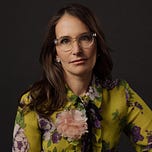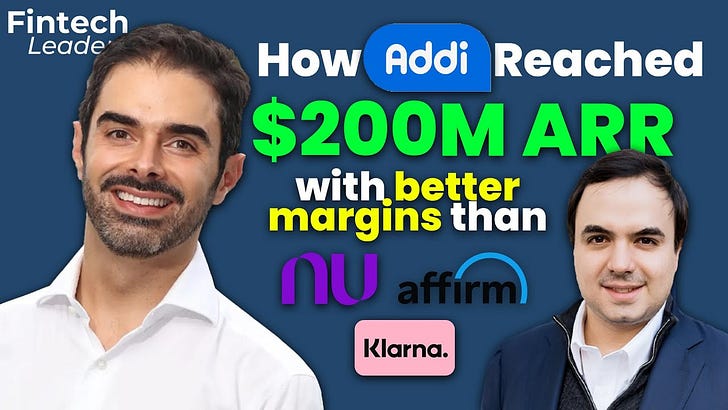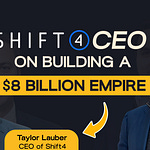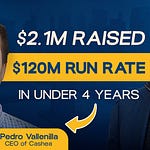This article is part of Fintech Leaders, a newsletter with 70,000+ builders, entrepreneurs, investors, regulators, and students of financial services. I invite you to share and sign up. If you enjoy this conversation, please consider leaving a review on Apple, Spotify, or Youtube.
I sat down with Jackie Reses for our third podcast in four years. Jackie is the CEO and Co-Founder of Lead Bank, a pioneering bank that's reimagining modern financial infrastructure and fintech partnerships. Jackie previously held leadership roles at Square and Yahoo, and served on the board of Alibaba, working alongside visionaries like Jack Dorsey and Jack Ma.
In this episode, we discuss:
How Lead Bank achieved instant product-market fit before even acquiring their bank charter
"Even before we owned lead, we had instant product market fit. Once people knew what we were doing, we were overwhelmed with inbounds that were overwhelming."
Lead Bank's origin story comes from Jackie Reses' own battle scars from the fintech trenches. After years at Square helping scale one of the world's most successful fintech companies, Jackie lived firsthand the complicated process of banking partnerships that could make or break a fintech's success. By late 2021, she decided to solve the problem by becoming the solution. "We started with a struggle," Jackie explains, "which is always a great place as an entrepreneur to start founding a business." Her thesis was simple: whether you're Uber, John Deere, Walmart, or a scaling fintech, integrating with the financial ecosystem was universally painful. With that insight, she launched Lead Bank, acquiring the bank in Kansas City by August 2022. What happened next surprised her - even before the ink was dry on the bank acquisition, major fintechs and potential clients started lining up, willing to bet their infrastructure on Jackie's vision of building scalable financial services.
Lead Bank has quickly attracted an impressive roster of clients, ranging from some of the largest fintechs in the world to scaling startups. When the SVB crisis hit, the flood of inbound interest validated their thesis that the market was desperately crying out for a bank that could provide modern, API-first infrastructure. "People were willing to bet on us," Jackie recalls, "which I'll forever remember, and they were willing to come to Lead anyway, even within months of us owning the company, because they believed in our long-term vision."
Why banking regulation needs a "first principles" approach and why the CFPB may need significant reform
"I went to Wharton, and when I go to take out a mortgage for my own house, I don't understand what I'm signing, because the disclosures have gotten so complicated... you now sign 400 pages of disclosures, and so it now has the unintended consequence that you don't read one bit of it."
While most financial regulators maintain a steady hand - Treasury, OCC, and FDIC are what Reses calls "steady Eddy hands who understand how global markets work" - the CFPB stands out to her as an agency in need of reform. Created post-Dodd-Frank, the bureau has evolved from its consumer protection mandate into what Jackie describes as a "highly polarized" force that often creates more problems than it solves.
Case in point: the agency's recent crusade against "junk fees" pushed so hard it forced banks to seek profits elsewhere, creating unintended ripple effects throughout the system. "You push on one side, something comes out the other," she explains. The consequences are tangible - increased regulatory requirements have led major banks to abandon small business loans under $250,000, leaving a critical financing gap for small businesses.
Jackie’s solution? Strip everything back to first principles. Rather than layering on more complexity, she advocates for a fundamental rethinking of how we protect consumers while maintaining a dynamic financial system. "I'd like to see everything boiled back to first principles and thought through in a digital-first way, so that I know what product I'm taking out, have some protection, but don't need someone telling me how to manage my life."
The evolution of AI in financial services and why regulators are becoming more open to algorithmic innovation
"The last eight years has been a total change of heart from a financial regulatory point of view. The FDIC, for example, has a very strong group of research scientists that comes out that does model reviews with us."
Jackie has witnessed first-hand a notable evolution in how financial regulators view AI and machine learning in the industry, marking an important shift in the regulatory landscape over the past eight years. From initial skepticism about algorithmic underwriting, where basic machine learning models were viewed with suspicion, regulators have moved to a more sophisticated understanding of AI's potential in financial services. "The FDIC, for example, has a very strong group of research scientists that comes out and does model reviews with us," she notes, as an example on how regulators are now actively engaging with the technology rather than simply restricting it.
The key shift has been focusing on outcomes rather than technology - as long as AI models don't create disparate impact in their results, regulators are increasingly comfortable with their use. This transformation has enabled the deployment of sophisticated models across the spectrum that are pushing boundaries, from basic payment risk assessment to lending decisions, with the regulatory approach evolving from basic heuristics to machine learning to neural networks. The most sophisticated fintech companies will likely push the envelope on lending models, testing the boundaries of what's possible while maintaining regulatory compliance, opening new possibilities for innovation in financial services.
Invaluable leadership lessons from working with Masayoshi Son, Jack Ma, and Jack Dorsey... and lots more!
"Masa operates on trust and loyalty... we would do nine months worth of work in the weeds every day, and then Masa would come in and say, 'I want to know what the key principles are of this deal. That is fine. I trust that we will make this transaction happen.'"
Jackie has been able to work with and learn from some of technology's most visionary leaders. Each one has profoundly shaped her leadership philosophy and allowed her to grow as a person.
Her experience with working with Masayoshi Son from SoftBank while serving on the board of Alibaba, revealed a sharp contrast in styles - while she felt like the "the nerdy girl scout in the weeds" conducting detailed nine-month negotiations, Masa would sweep in with his trademark big-picture approach: "I want to know what the key principles are of this deal. That is fine. I trust that we will make this transaction happen." This trust-based leadership style, though radically different from her own detail-oriented approach, taught her lessons about scaling vision.
Working with Jack Dorsey at Square proved to be "an extraordinary partner" in building products, showing her how technical precision could merge with ambitious vision, while her experience on Alibaba's board with Jack Ma and Joe Tsai provided critical insights into scaling global operations.
"When you work with people like that, they both teach you a lot about who you are as a person and who you are as a leader." These experiences from tech's most influential figures have deeply shaped her leadership style at Lead Bank, where she combines their lessons - Masa's trust-based delegation, Dorsey's product rigor, and Ma's scaling expertise - with her own meticulous approach to execution. "I appreciate that there's not one of those people who won't tell me that I'm stupid, and I love every bit of that."
Want more podcast episodes? Join me and follow Fintech Leaders today on Apple, Spotify, or your favorite podcast app for weekly conversations with today’s global leaders that will dominate the 21st century in fintech, business, and beyond.
Previous Episodes You May Enjoy:
























